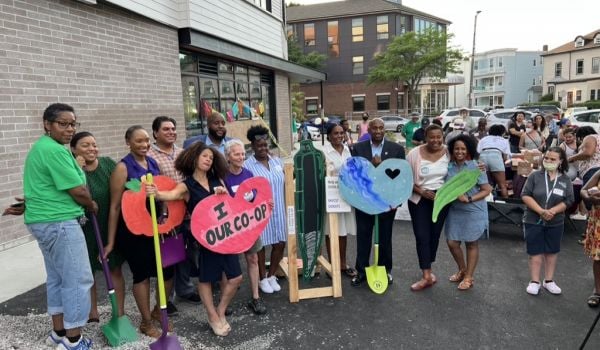When Massachusetts banned rent control in 1994, via a statewide ballot referendum, only three cities — Boston, Cambridge, and Brookline — had some form of the policy on the books. But some housing advocates and tenant organizers in those cities and around the Boston area have never let go of the demand to have rent control restored. And now they’re hoping that a runaway local housing market and a growing national tenant movement has built enough support to help them overturn the ban.
In the spring, two state representatives introduced a bill intended “to provide municipalities with a variety of flexible options to help address the housing emergency in a locally appropriate manner.” The bill, similar to a statewide measure that was adopted in New York in June, would allow cities to create their own rent-control policies, just-cause eviction protections, regulations around condo conversions, and other tenant-protection policies. Boston advocates organized a rally in favor of rent control in front of the Massachusetts State House last week.
State Rep. Mike Connolly, who represents parts of Cambridge and Somerville and who co-introduced the Tenant Protection Act with State Rep. Nika Elugardo, who represents parts of Boston and Brookline, says he’s always been generally favorable toward the idea of rent control, but it’s only in the last few years that bringing it back to Massachusetts has started to seem viable. That’s largely because of the “housing emergency” in the area, Connolly says. Rents in Massachusetts are less affordable than every state except Hawaii and California, and the Boston metro area is the fourth most expensive rental market in the country, according to the National Low Income Housing Coalition. And tenant organizing has helped build rent-control victories around the U.S. over the last year, paving the way for Boston and Massachusetts to reconsider its policies.
“I think what you’re seeing around the country now, in places like Oregon, New York, and California, is a sense that we need to be more proactive in trying to stabilize communities,” Connolly says.
Kathy Brown, coordinator of the Boston Tenants Coalition, says that prior to the ballot referendum that banned rent control in the 1990s, landlords had tried to fight the policy at the local level in each of the cities where it was on the books. But tenants and elected officials in those cities always had enough support to keep rent control in place. The statewide referendum didn’t reflect the democratic will of Massachusetts as much as a well-financed real estate industry campaign against rent control in places that had never adopted it, Brown says.
“[The landlord lobby] tried to do all the legal routes to get it overturned [locally], but the three towns were like, ‘No, we want it,’” Brown says. “They got it on the [state] ballot and then they did crazy marketing all over western Massachusetts.”
Even after the 1994 referendum, rent control has remained “the demand on the street” among tenants in the Boston area, Brown says. (For more on the campaign to overturn rent control and the history of the policy in Massachusetts, read this piece from Shelterforce.) But in the interim, tenant advocates have fought for more modest protections. And even many of those have failed, says Lisa Owens, executive director of the group City Life/Vida Urbana. One example was the Jim Brooks Act in the Boston City Council, a proposal which started out as a substantial set of tenant protections, but was chipped away at over the course of several years, as WBUR covered closely. In its final form, the proposal was a modest set of requirements to notify tenants of their rights after they receive an eviction notice, Owens says. But even that watered-down version of the Act still failed.
“A lot of our allies got together, saying that what we’re asking for is so basic and it’s the same forces coming down so strongly on the side of private property and greed,” Owens says. “There was this broad consensus after those losses that we have to fight for what’s big and bold and what we really need, because if we fight for small things that are incremental, we still get the same forces coming back at us.”
Connolly echoed that sentiment, saying that the real estate industry has lined up against much tamer policies than rent control, like a real estate transfer fee to fund affordable housing.
“I can honestly say that I’ve been in conversations talking about other policies with representatives of groups like the Chamber of Commerce and have often been met with resistance to very modest ideas,” Connolly says.
Tenant advocates have led the charge on building support for rent control, Connolly says. Connolly says he supports the policy as one prong of a larger “guaranteed program of housing for all,” which includes production of affordable housing and resources to address homelessness, which has been on the rise in Massachusetts. He is wary of housing advocates “fixating on any single tactic,” but says he’s glad to see that the coalition pushing for rent control is growing, both locally and around the country. The bill currently has 20 co-sponsors, and will get a hearing in either November or January, he says.
“For a decent while after that ballot question, it was assumed that the voters spoke on this, and this is now the new landscape,” Connolly says. “Part of what we’re seeing this year is the recognition that, OK, it’s been 25 years. The economy has changed in significant ways and the real estate market has changed in dramatic ways, so we’re now in a good place, where it’s reasonable for us to want to do this.”
This article is part of Backyard, a newsletter exploring scalable solutions to make housing fairer, more affordable and more environmentally sustainable. Subscribe to our weekly Backyard newsletter.

Jared Brey is Next City's housing correspondent, based in Philadelphia. He is a former staff writer at Philadelphia magazine and PlanPhilly, and his work has appeared in Columbia Journalism Review, Landscape Architecture Magazine, U.S. News & World Report, Philadelphia Weekly, and other publications.
Follow Jared .(JavaScript must be enabled to view this email address)


















